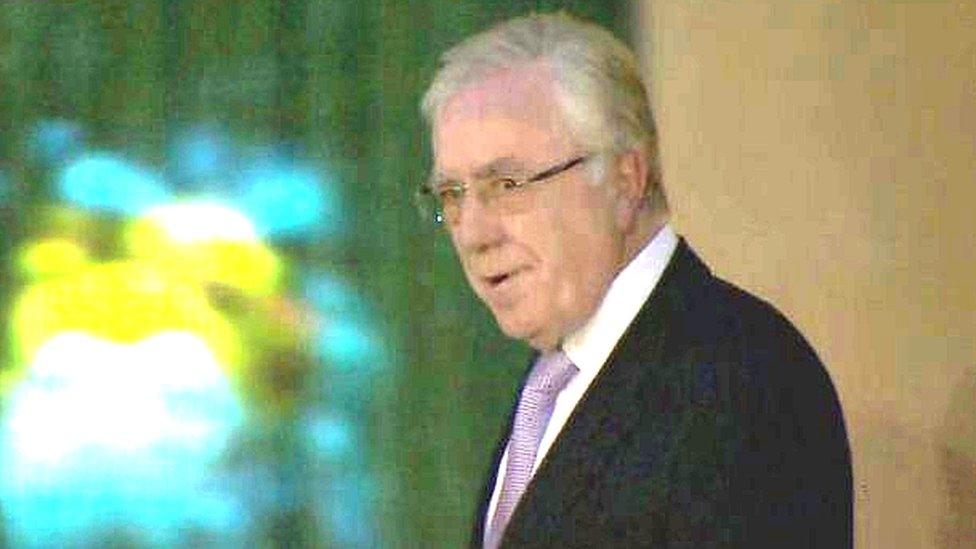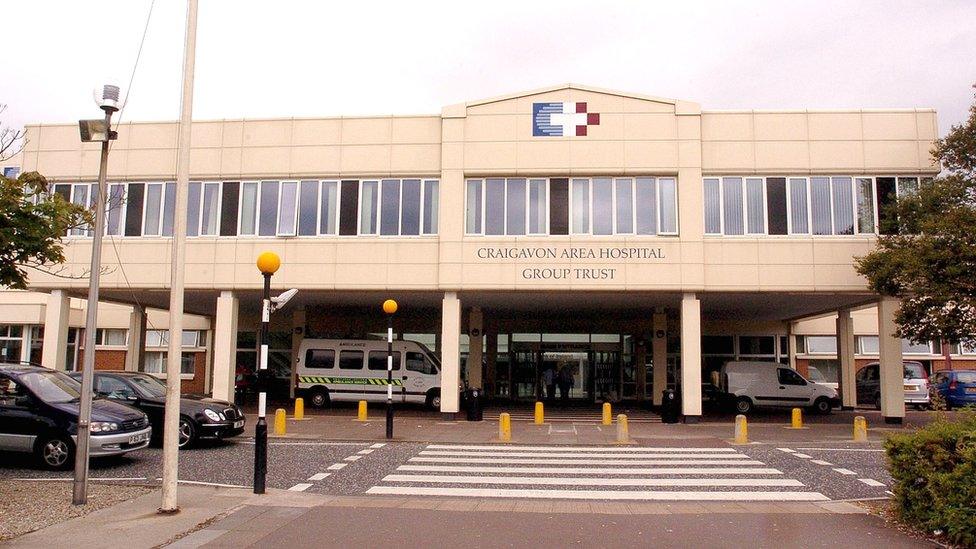O'Brien urology inquiry: Swab 'left inside patient for months'
- Published

Aidan O'Brien worked at the Southern Health Trust from 1992 until his retirement in July 2020
A consultant urologist left a 6.5cm swab in a patient after surgery and failed to identify it in a scan three months later, an inquiry has heard.
The public inquiry concerns the work of Aidan O'Brien at the Southern Trust between January 2019 and June 2020.
It heard Mr O'Brien endangered or potentially endangered lives by failing to review medical scans.
He previously claimed the trust provided an "unsafe" service and was trying to shift blame on to its medics.
On Tuesday, the inquiry into Mr O'Brien's clinical practice heard almost 600 patients received "suboptimal care".
A 'never event'
Counsel for the inquiry Martin Wolfe KC said the 6.5cm swab was left inside a patient by Mr O'Brien during a bladder tumour operation in July 2009.
The error was described as a "never event - in other words, one that should never happen".
At a CT scan appointment three months later in October 2009, a mass inside the patient's body was discovered by the reporting consultant radiologist.
While he did not say it was a swab, he did "highlight the abnormality", said Mr Wolfe.
A report was sent to Mr O'Brien but, the Inquiry heard, he did not read it and no one took steps to check out the abnormality.

Urology consultant Aidan O'Brien worked at Craigavon Area Hospital before his retirement in July 2020
On top of this, the Inquiry was told, a four-month review never took place due to waiting list issues.
The patient then attended A&E on 6 July 2010 after suffering from abdominal pain for two weeks.
This led to emergency surgery when the swab was found and removed.
Following an investigation into the incident, a directive was issued by the trust to all consultants that scan results should be reviewed as soon as available.
But Mr Wolfe said Mr O'Brien later challenged a trust manager on the directive and did not appear to comply with it.
By failing to review scans, Mr O'Brien's patients were "endangered or potentially endangered", Mr Wolfe said.
Mr Wolfe told the inquiry of a number of incidents where Mr O'Brien had not reviewed follow-up scans.
In another case, a patient's scan identified a cancerous tumour but Mr O'Brien did not respond to an email from the radiologist highlighting this.
It was also not followed up by the radiology department to its cancer tracker team, meaning the patient did not receive treatment at an earlier stage.
Mr Wolfe said a review of this case recommended a system in which consultants would have to electronically sign off receipts of such emails.
Issues to explore
Mr O'Brien worked at the Southern Health Trust from 1992 until his retirement in July 2020.
He was temporarily excluded from the workplace in 2017 before returning under supervision.
The inquiry was told the trust had questions to answer over why Mr O'Brien's work was seemingly left unchecked.
"It is unclear how this was resolved, if at all, and it is the kind of governance issue the inquiry will want to discuss at these hearings," Mr Wolfe said.
"It does not appear that the trust implemented any form of monitoring of Mr O'Brien's management of patients' results and whether he ever complied is unclear, but subsequent actions indicate he may not have done so."
Summing up, Mr Wolfe laid out the issues for the inquiry to explore in light of practices which endangered patients lives at Craigavon Area Hospital.
The issues Mr Wolfe recommended be explored in questioning are:
Failures of triage
Delays in diagnosis
Failures to refer patients to specialists, oncology and specialist surgery
Failure to implement multi-disciplinary meeting decisions on time or at all (ie management groups)
Failures to utilise specialist care nurses
Failures to access or read reports including those from radiology
Delays in outpatient appointments
Poor secretarial performance and poor communication
Mr Wolfe suggested the inquiry explore whether there was a prevailing culture of turning a blind eye over the coming days of evidence.
Related topics
- Published8 November 2022

- Published21 June 2022

- Published24 November 2020
